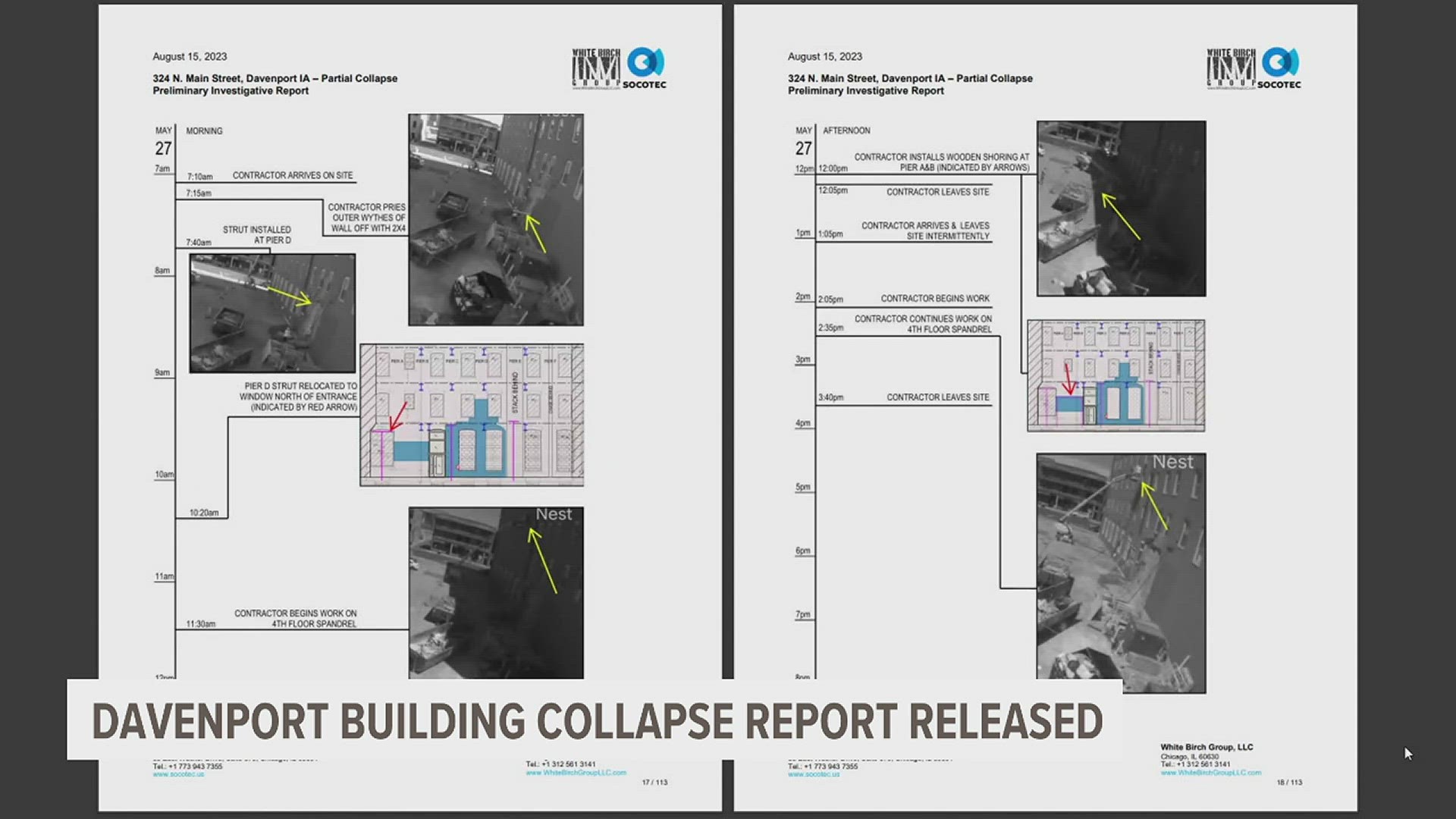DAVENPORT, Iowa — The City of Davenport has released the findings of what caused the fatal partial collapse at 324 Main Street. The report was completed in partnership with the City of Davenport, White Birch Group, LLC and SOCOTEC Engineering Inc.
Root causes of building collapse
Inadequate Capacity of Wall System
The removal of multiple wythes of masonry during the repair work in the three days preceding the collapse severely compromised the western bearing wall and caused it as well as the areas it supported to collapse on May 28, 2023. The temporary shoring that had been installed was grossly inadequate. Had a proper shoring and construction phasing plan been implemented during these repairs, the Building would not have partially collapsed on May 28, 2023.
Inadequate Shoring
The temporary stabilization methods specified by the Design Professionals during various repair projects for the Building do not appear to have considered that the western wall served as a critical structural load-bearing element. Additionally, the shoring implemented by the most recent masonry repair contractor at the subject Building does not conform to usual and customary practices for masonry wall shoring or stabilization. The attempted installation was severely lacking in multiple aspects:
- The shoring did not engage any masonry other than limited portions of the exterior wythe.
- The spacing of the shoring was inadequate given the extent of the brick removal.
- The shoring members were severely undersized.
- The shoring was inadequately restrained at both the top interface with the wall and the bottom interface with the pavement.
The report found several so-called "proximate and interrelated causes" of the collapse, " the resultant condition of the wall created by the improper implementation of the late May 2023 repairs resulted in the May 28, 2023, collapse incident" the report said.
Proximate causes of building collapse
Improper Understanding of Original Building Construction
The engineers and masonry contractors responsible for repairs to the Building repeatedly misidentified the structural bearing wall as a nonstructural system. As such, they underestimated the significance of the observable signs of distress in the wall, delayed necessary repair work, designed and installed a weaker replacement system, and removed significant portions of the wall without first installing adequate temporary shoring.
Inadequate Construction Documents
The available Construction Documents for repair work conducted between 2020 and 2023 do not provide adequate details and specifications for a contractor to implement the repair work necessary at the subject Building. This resulted in the implementation of many incomplete and inadequate repairs. Furthermore, this lack of documentation limited the City Inspectors’ ability to easily verify that the work being performed was consistent with the engineer’s intent.
Neglect of Composite Wall
The Design Professionals and masonry repair contractors replaced portions of the original 5 wythe thick bearing wall with a substantially weaker non-composite cavity wall system.
Inadequate Oversight of Repairs
The deficiencies with the design and implementation of repairs noted herein were exacerbated by the lack of on-site presence by a qualified Design Professional during the repair work. This lack of professional oversight allowed the work by the most recent repair contractor to proceed in an unsafe, incomplete, and improper manner.
Inherent Weakness of West Wall
Several conditions inherent to the construction and age of the west elevation wall allowed for reduced cross section of the wall, and resulting weaknesses in the wall, especially at Pier E. Although these construction practices were usual and customary for buildings of the subject Building’s age, when Piers B, C and D failed, Pier E’s inherent weaknesses caused it to fail as well.
Inadequate Repair Techniques
The improperly repaired brick masonry wall sections were poorly integrated with the original construction and increased the inherent weakness of the west elevation wall.
Inadequate Frequency and Type of Maintenance
The subject Building exhibited many signs of improper and inadequate exterior envelope maintenance, resulting in excessive water infiltration. Improperly maintained composite clay brick masonry walls will degrade over time due to water infiltration and the effects thereof, resulting in a structurally weakened wall system. Based on the photographic evidence of pre-collapse condition, in addition to on-site observations after the incident, it is apparent that building ownership/management did not adequately address exterior (and other) maintenance requirements, thereby resulting in the compromised integrity of the west elevation wall.
In the days following the building collapse, the City of Davenport confirmed three people died in the collapse: Branden Colvin Sr., Ryan Hitchcock, and Daniel Prien.
News 8 has heard from the owner of the building, Andrew Wold, once with a statement to the media which said, "thoughts and prayers" to those impacted by the disaster.
Here is the full statement from May 2023
"Our thoughts and prayers are with our tenants and families during this difficult time.
"We would like to thank the brave men and women of Davenport fire, Davenport police department, and all other first responders for their tireless efforts to ensure everyone's safety.
"We have been working closely with the American Red Cross and other agencies to assist the displaced tenants affected by this event. We are forever grateful to them for all of their assistance with our tenants.
Andrew Wold, Owner
Sarah Tyler, Libby Mills & the entire property management team"

